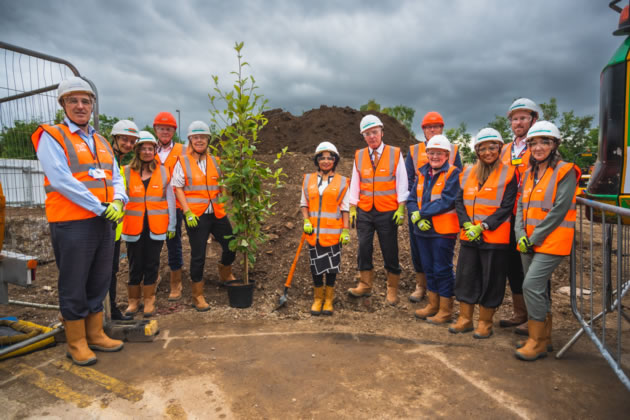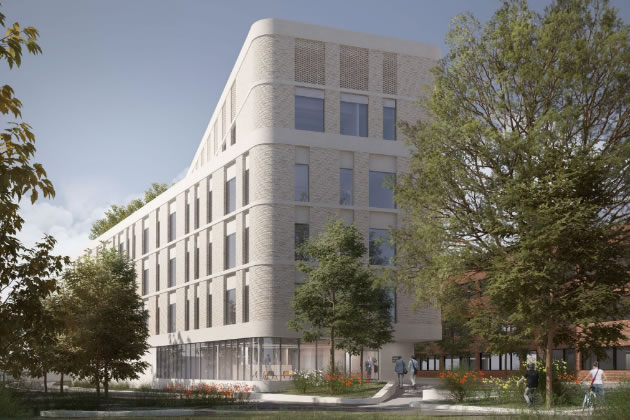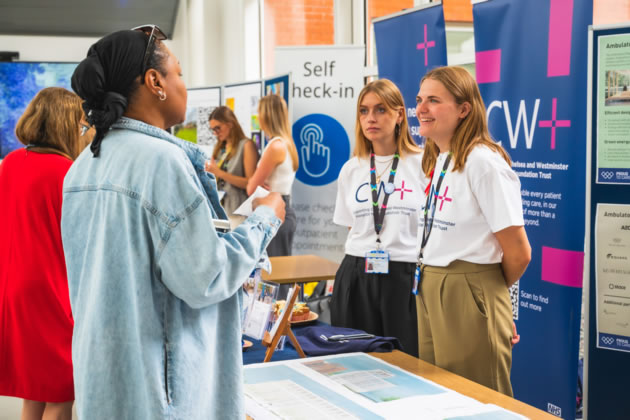Ground Broken on New West Mid Diagnostic Centre
£80 million project aims to reduce treatment times

A memorial tree was planted at the groundbreaking ceremony
|
July 24, 2024
This Tuesday (23 July) ground was broken to commence building works at a new £80 million NHS Ambulatory Diagnostic Centre (ADC) at West Middlesex University Hospital.
The facility, which is the largest capital project that the Trust has ever run, aims to significantly improve treatment times for patients.
In attendance at the groundbreaking ceremony was Ruth Cadbury, MP for Brentford and Isleworth who donned hi-viz and hard hat as she headed on to the construction site with Trust executives as well as the Operations Director from Bouygues UK, who have been contracted to complete the works.
At the event, a memorial tree was planted just in front of the site where the new building will be built, to commemorate the occasion along with a new bench made completely of recycled materials from the demolition site and plaques that will remain in the hospital.
A five-storey building will provide essential diagnostic and treatment services for cancer, renal conditions and imaging to residents within Hounslow, Richmond and Ealing. The ADC is expected to deliver a 43% increase in elective diagnostic capacity. This expansion will translate to approximately 67,000 additional imaging scans, increasing the chances of a timely and efficient diagnostic service for patients.

A visualisation of the new centre in Isleworth. Picture: Aecom
In cancer care, the new facility will nearly double the current capacity for chemotherapy treatments, increasing the number of chairs from 10 to 18. This enhancement will enable the hospital to deliver approximately 3,000 more cancer treatments over the next ten years, marking a 48% growth from the first year of the ADC's operation to year ten.
Renal services will also see a significant boost, with the number of dialysis chairs increasing from 12 to 24, representing a 100% increase in capacity, allowing for an additional 72 outpatients to be treated locally.
In the main hospital atrium, informative stalls were held by partners, including the hospital’s charity CW+, which supported the event and is raising £1.5 million to fund a programme of patient enhancements in the new facility. Bouygues UK also had a stall and information was available for staff and patients about the benefits of the new ADC.

Stalls were set up in the main hospital atrium with information about the project
The building was partly funded by £16.5 million capital grant from NHS England and fundraising efforts from CW+ which is committed to raising £1.5 million for a programme of enhancements within this landmark facility
Lesley Watts, Chief Executive at the Trust said, “Today marks a critical milestone as we break ground to officially start construction of the long-awaited ADC, representing our unwavering dedication to delivering the best possible care for our community.
“It’s about making sure that everyone has access to the treatment they need, closer to home. We’re also committed to creating a sustainable future for generation to come and this all-electric building is a big step in that direction.”
Fabienne Viala, Chair and CEO of Bouygues UK added, "We are thrilled to officially break ground at the site of this transformative project for Chelsea and Westminster Hospital NHS Foundation Trust that is set to bring essential diagnostic and treatment services right to the doorstep of the local community.
“Through our partnerships with MITSkills, the London Borough of Hounslow, and JCP Hounslow, we aim to help foster skills-development and create sustainable employment opportunities for local residents with our apprenticeship and work-experience programmes. Our goal is to leave a lasting legacy that extends beyond the completion of this vital facility."
Councillor Lily Bath, Hounslow Council's Portfolio Holder for Adult Social Care, Public Health and Health Integration said, "Hounslow Council is delighted to be part of this groundbreaking event which marks an important milestone for the development of the Ambulatory Diagnostic Centre.
"As a close partner of West Middlesex University Hospital, everyone at Hounslow Council understands the vital importance of making sure our local communities get care as close to home as possible, and we believe that this development will transform healthcare outcomes for the local population for years to come."
Like Reading Articles Like This? Help Us Produce More This site remains committed to providing local community news and public interest journalism. Articles such as the one above are integral to what we do. We aim to feature as much as possible on local societies, charities based in the area, fundraising efforts by residents, community-based initiatives and even helping people find missing pets. We've always done that and won't be changing, in fact we'd like to do more. However, the readership that these stories generates is often below that needed to cover the cost of producing them. Our financial resources are limited and the local media environment is intensely competitive so there is a constraint on what we can do. We are therefore asking our readers to consider offering financial support to these efforts. Any money given will help support community and public interest news and the expansion of our coverage in this area. A suggested monthly payment is £8 but we would be grateful for any amount for instance if you think this site offers the equivalent value of a subscription to a daily printed newspaper you may wish to consider £20 per month. If neither of these amounts is suitable for you then contact info@neighbournet.com and we can set up an alternative. All payments are made through a secure web site. One-off donations are also appreciated. Choose The Amount You Wish To Contribute. If you do support us in this way we'd be interested to hear what kind of articles you would like to see more of on the site – send your suggestions to the editor. For businesses we offer the chance to be a corporate sponsor of community content on the site. For £30 plus VAT per month you will be the designated sponsor of at least one article a month with your logo appearing if supplied. If there is a specific community group or initiative you'd like to support we can make sure your sponsorship is featured on related content for a one off payment of £50 plus VAT. All payments are made through a secure web site. |